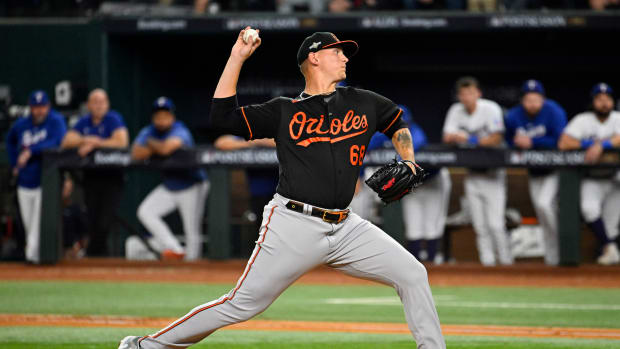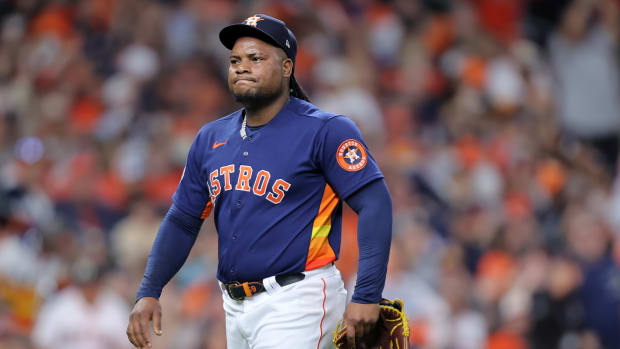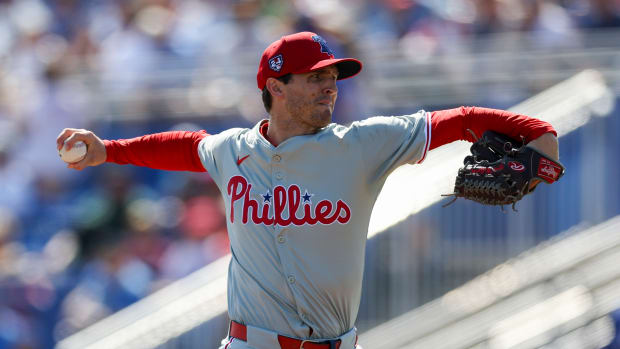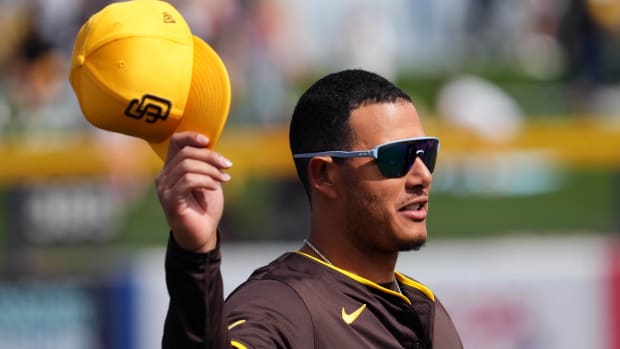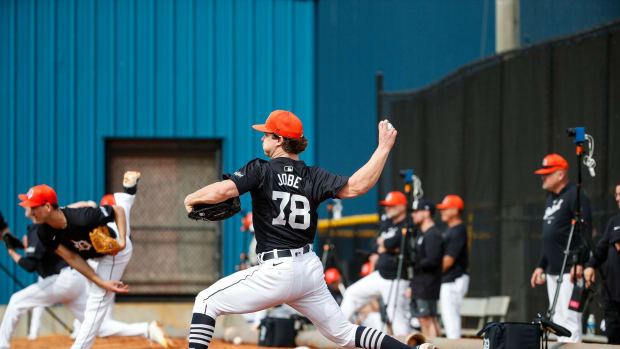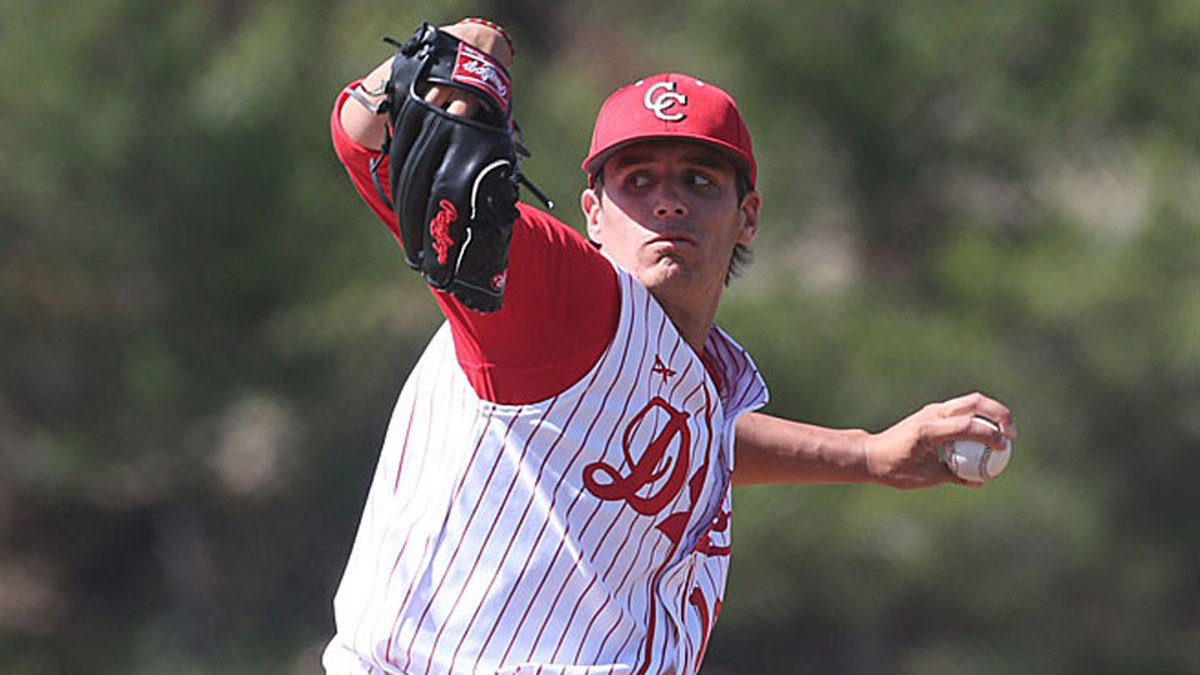
Deadline looms for Astros, No. 1 pick Aiken to resolve contract fight
Friday at 5 p.m. Eastern marks the deadline for teams to sign their picks from the 2014 draft, and as the hours dwindle, an ugly and potentially explosive situation is brewing in Houston. Overall number one pick Brady Aiken remains unsigned, with the player's advisor and the team apparently in disagreement over the condition of his elbow. Because of the way MLB's draft bonus pool works, that situation is affecting the fates of two of the team's other picks.
The Astros took Aiken, a 17-year-old lefty out of San Diego's Cathedral Catholic High School, with the first pick back on June 7. Via the bonus pool system put in place under the current Collective Bargaining Agreement, the team is allowed to spend $13,362,200 on their picks within the first 10 rounds, each of which has an assigned slot value. Those individual figures are recommendations, but if the total money spent on those picks exceeds their overall allowance, they face stiff penalties:
- A 75-percent tax on the overage between 0-5 percent;
- A 75-percent tax on the overage between 5-10 percent, plus the loss of next year's first-round pick;
- A 100-percent tax on the overage between 10-15 percent, plus the loss of next year's first- and second-round picks;
- A 100-percent tax on the overage above 15 percent, plus the loss of two future first-round picks.
Losing any of those future first-round picks would crush the team's bonus pool — the sum of each of those slot values — in that season since the first-round value makes up more than half of the allotment; for this year, the value of the overall first pick is $7,922,100.
In both 2012 and '13, Astros general manager Jeff Luhnow used the team's leverage to get number one overall picks Carlos Correa, a shortstop, and Mark Appel, a righthanded starter, to agree to lower figures ($4.8 million in Correa's case, $6.35 million in Appel's), then applied the savings toward lower-round picks so as to pay them above-slot bonuses. Via MLB.com's Jim Callis, the team and Aiken, represented by agent Casey Close, agreed to a $6.5 million bonus on the night of the draft, a figure tied with that of 2010 No. 2 pick Jameson Taillon of the Pirates as the largest bonus ever given to a high school pitcher. With the savings, they reached a $1.5 million bonus agreement with another Close client, pitcher Jacob Nix, whose fifth-round slot value was just $370,500.
Despite those agreements, both deals remains unconsummated. Teams aren't allowed to administer full physical examinations to players until after the draft, and when the Astros' doctors examined Aiken, they found a problem with his left elbow. Because of HIPAA regulations, the team isn't allowed to discuss his medical records publicly, and they haven't done so, but the Houston Chronicle's Evan Drelich has reported that the pitcher has a congenitally small ulnar collateral ligament:
A person with knowledge of the situation told the Chronicle on Tuesday that there is a “cut-and-dry” issue with the anatomy of Aiken’s ulnar collateral ligament, even though he is currently able to pitch. Aiken has visited five doctors, the person said: Two affiliated with the team and three who were not, including the renowned Dr. James Andrews.
“He may have some (of the UCL), but not much,” the person said, adding that Tommy John surgery, which has become common in baseball, would not be a straightforward solution in this instance.
Drelich went on to quote Dr. Chris Geary, a Tufts Medical orthopedic surgeon who has not examined Aiken, as saying "[F]or whatever reason, his anatomy is different, but it’s not impacting him… It sounds to me like it’s not completely straightforward. It’s one of those things you could maybe, depending on what it actually is, you could kind of spin it depending on what your own agenda is.”
Aiken was viewed as healthy prior to the draft, having pitched pain-free and reaching 97 mph with his fastball in his final high school game, but the Astros apparently see his UCL abnormality as elevating his risk of Tommy John surgery. This isn't the first time a UCL abnormality has gotten in the way of a big bonus; most famously, R.A. Dickey, a first-round pick by the Rangers back in 1996, was discovered in his post-draft physical not to have a UCL at all, and the Rangers reduced their initial bonus offer of $810,000 to a mere $75,000.
Last week, the Astros' offer to Aiken had reportedly been reduced to $5 million. More recently, Close told Fox Sports' Ken Rosenthal that the offer was for just $3,168,840, 40 percent of slot value — the minimum offer required for the team to receive a compensatory pick, in this case the No. 2 pick in next year's draft, without forfeiting the bonus money. Moreover, Close has claimed that the lowball figure is so that the team can give a $1.5 million bonus to 21st-round pick Mac Marshall, another high school lefty, so as to buy him out of his commitment to Louisiana State University.
All of this has raised the ire of the Major League Baseball Players Association, which believes that the Astros are acting unethically. Union leader Tony Clark told CBS Sports' Jon Heyman, "It's disappointing on a number of fronts with all that's happened with respect to the draft process… You can rest assured the manipulation we think happened is going to lead us to have a conversation.”
Via Heyman, MLB senior vice president Dan Halem told reporters at this week's All-Star luncheon, "We believe the Astros have conducted themselves appropriately." Via Rosenthal, MLB spokesman Pat Courtney backed that by saying, "Major League Baseball is comfortable that the Houston Astros have acted in complete accord with major league rules."
The problem for all parties involved is that if the Astros can't strike an agreement with Close and Aiken at any figure by the 5 p.m. deadline, they lose the entire $7.9 million allocation from their draft pool, which means that they wouldn't have the money to sign Nix or Marshall at their agreed figures without penalty. If they don't complete the deals, that would be a crushing blow to their ongoing rebuilding effort, particularly given that Correa's season ended due to a broken fibula in late June and that Appel has been rocked for a 10.80 ERA in 38 1/3 innings at High-A Lancaster after missing most of spring training due to an appendectomy and more recently battling a wrist problem that required a cortisone shot.
Aiken has a commitment to UCLA if he doesn't sign, but if he goes that route, he won't be eligible for the draft again for three years, until after his junior season. There's some question as to whether he's even still eligible due to the NCAA's absurd, convoluted rules regarding player representation. If Close has directly negotiated on Aiken's behalf toward a professional contract, he's considered to be an agent, and Aiken would thus be ineligible to play at a Division I school. If Close has merely advised Aiken but not participated in the negotiations, then Aiken is free to play for the Bruins.
For his part, Luhnow has maintained that the negotiations have been with Aiken's family, suggesting he wouldn't go the scorched earth route that the Phillies went last year when they couldn't sign fifth-round pick Ben Wetzler; Philadelphia claimed to have negotiated with his agent — which is what happens in a vast majority of draft cases, paradoxically both the industry norm and against the rules. After an investigation, Wetzler was allowed to return to Oregon State after serving an 11-game suspension.
At this point, there are three likely scenarios:
- Aiken signs at some figure by the deadline, with Nix and/or Marshall following suit and starting their professional careers in short order.
- Aiken doesn't sign and instead chooses to go to UCLA, with the Astros likely losing out on all three picks but getting the second overall pick next year (when they may wind up with the number one as well if they finish with the majors' worst record for the fourth straight season).
- Aiken doesn't sign and goes to either junior college or independent ball. Either would make him eligible for next year’s draft; former first-round picks Aaron Crow, Luke Hochevar and Tanner Scheppers are among those who have pursued the latter route in recent years.
If Aiken goes either the second or third route, he could pursue a grievance against the Astros via the MLBPA or file a lawsuit claiming that the Astros acted to damage his market value.
One way or another, this is an ugly mess, the result of the draft system to which the MLBPA agreed in the most recent CBA, one that sells out amateurs — both domestic and, in the case of international signing caps, foreign as well — in exchange for other concessions. The Astros have most of the leverage here, but both they and Aiken have plenty to lose. The bet here is that the two sides hash out an agreement, because what lies ahead if they don't will be even uglier and more explosive than it already is.






























